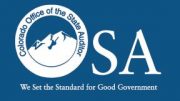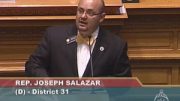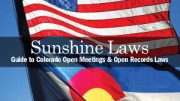By Jeffrey A. Roberts
CFOIC Executive Director
It’s natural, especially for a journalist, to be skeptical of any proposal calling for public financing of journalism. Last spring, when some Longmont residents first suggested the creation of a news operation funded by a library district tax, a reporter asked me to discuss the caveats.
Quite a few came to mind.
“Readers need to understand the difference between a government-run news source and a nonprofit or an advertising/subscription-supported news organization,” he quoted me as saying. “A vital function of the news media is to provide the public with an independent source of information, one that doesn’t just report what public officials say.”
An independent news organization “goes deeper,” I told him. “It examines the records, looks for other points of view and acts as a watchdog over government activities and spending. While a city-run or a library district-run site might offer some useful and interesting community news, it’s not an adequate replacement for independent, professional journalists covering municipalities, school districts, counties and library districts.”

As a former newspaper reporter and editor, I’ll always feel that way. A free and independent press is fundamental — it is essential — to American democracy at all levels.
But knowing that is precisely why Coloradans must begin a conversation about alternative ways to fund local journalism — even ways that involve public dollars.
If you’re reading this essay on the website of the Colorado Freedom of Information Coalition, you likely already know that local news isn’t thriving the way it once did. Market forces. Technology. Ownership issues. The causes are many.
But the bottom line is the Fourth Estate’s fundamental role in our democracy is endangered, particularly at the state and local level. And it’s time to do something.
A new call for “bold action” comes from a Colorado Media Project working group that included me, CFOIC president and media attorney Steve Zansberg and CFOIC board member Jill Farschman, CEO of the Colorado Press Association:
“Free and independent local news is a public good that is vital to democracy,” the group’s just-published report says, “and all Coloradans, including community leaders, should seriously consider public support as one of the necessary vehicles to sustain and evolve local public-service journalism.”
“New ideas, new approaches, and new products and services are desperately needed to ensure the reimagining and the very survival of high-quality journalism in Colorado, especially in underserved communities,” it stresses. “… We are at a crucial moment, a time of transition, and lack of action could lead to an increasingly polarized, polluted, and weakened information environment that is harmful to our democracy.”
The report outlines the causes and consequences of our state’s diminished news infrastructure. The solutions, it says, “must involve all of us” and “both public and private institutions as well as individuals in our state have a crucial role to play.”
If implemented, the working group’s recommendations would enhance funding for local news, not fully or even substantially subsidize it. The report also stresses that any public funding should be governed within a structure that “maximizes community participation, protects freedom of speech, ensures inclusivity, and prevents direct and indirect influence from any governmental body, department, or official as well as private individuals and businesses.”
That last part is particularly crucial. Those who receive funding must be insulated from those who decide where the funding goes.
Zansberg, a First Amendment expert, echoed this view in an email to me: “While I support supplementing the existing revenue streams supporting local journalism with public funds, it is crucial that public monies not play any role in influencing the editorial content, not be doled out (or withheld) on account of that content.”
Here are the report’s big ideas:
- Local information districts created by voters to raise revenue for meet local information needs.
- A state-level, public-private fund to stimulate local media innovation, test new business models and support independent, public-service journalism, especially in “news desert” communities.
- Programs that help local news media businesses transition to employee ownership, nonprofit or public benefit corporations, and other mission-driven models. State tax incentives would go to those who donate community news assets and seed philanthropic trusts to meet local civic information needs.
- Support for public libraries and higher education to play a greater role in meeting information needs.
- Optimizing government transparency for civic engagement by modernizing the ways state and local entities conduct open meetings, report public data and make information more easily accessible to journalists and the public.
That final recommendation above focuses on some systemic issues CFOIC has previously identified: records retention; open data; challenging open records denials without going to court; the often high cost of obtaining public records; making open meetings more accessible to the public; and sunshine law training for public officials.
“As the number of journalists working in Colorado has dropped significantly, it is more important than ever that they and the public have streamlined access to meetings of government officials and the vast amount of data collected by government agencies,” the report says.
Download the Colorado Media Project report, “Local News is a Public Good: Public Pathways for Supporting Coloradans’ Civic News and Information Needs in the 21st Century.”
Follow the Colorado Freedom of Information Coalition on Twitter @CoFOIC. Like CFOIC’s Facebook page. Do you appreciate the information and resources provided by CFOIC? Please consider making a tax-deductible donation.




